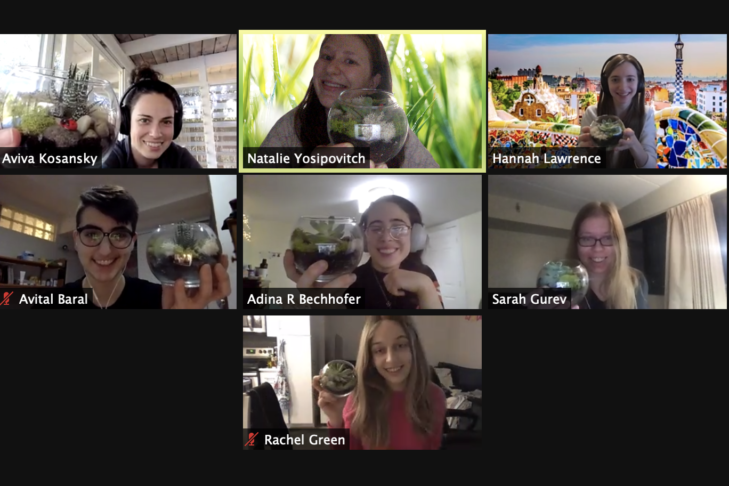Kehilla (community) is an important value in Judaism. A thriving Jewish community cares for the well-being of each member and brings those disparate individuals together to create something bigger than themselves. At MIT Hillel, our mission includes supporting and providing Jewish communities that strive “to satisfy the spiritual, intellectual, and personal needs of all Jewish students.”
I have the privilege of working with MIT Jewish graduate students as the director of graduate student engagement at MIT Hillel. I connect with students. I build relationships with and/or between students to support them in their lives, and in their Jewish journeys.
COVID-19 has generated new problems for graduate student engagement and community-building. Students are burned out from being on their computers and engaging online. I have needed to think about creative ways to engage MIT graduate students in an environment that is safe during the pandemic. I was particularly concerned about my first-year graduate students, who were entering graduate school with limited opportunities to meet their peers outside of their research labs and classes. I realized that online cohort experiences like Hillel’s Jewish Learning Fellowship had a lot of interest and engagement, but few of my first-year graduate students were participating in these opportunities. Based on my one-on-one conversations with these students, I discovered that most were interested in meeting each other and building community during a socially isolating time. The pandemic provided a unique opportunity to create and attract interest in a new initiative.
Because of the CJP Young Adult Community Impact grant, I was able to fund a cohort initiative to engage these students. The purpose of this cohort was to build a sense of community among First Year Graduate Students (FYGS) and to provide support, grounding and fun during a stressful, weird, first year. I wanted the FYGS to feel empowered to shape their own community and create their own Jewish initiatives; as part of participation, students organized or co-sponsored a wide range of programs, including holiday-centered, cooking, social and learning programs for their own community and the MIT Jewish graduate community at large.
In the FYGS cohort I had a diverse group of students from a variety of places around the world. These students also came from a wide range of Jewish backgrounds, from those who identified as cultural Jews to those who grew up in ultra-Orthodox homes. Participants were in different MIT graduate programs: some were starting Ph.D. programs, others were enrolled in master’s degrees like engineering and supply chain management. All were looking for community during this socially isolating time.
When asked to reflect on what they enjoyed most about the FYGS program, students indeed focused on how FYGS provided community for them during a difficult time, rather than highlighting any specific cohort events, sessions or opportunities. One FYGS participant from the MIT Sloan School of Management shared: “FYGS has made me feel connected to the greater MIT graduate student community, especially this year with everything being virtual because of COVID. Given the remote nature of things, it has been difficult to be in a community outside of my academic department, but FYGS really helped to build the greater MIT community for me.”
Another FYGS participant (a Ph.D. student in computer science) shared how FYGS helped her feel connected to Jewish community and her Jewish identity: “The FYGS program made me feel far more connected to the Jewish community of graduate students at MIT, and by extension the local Jewish community more broadly. During an especially isolated and virtual time, it was great to meet other Jewish graduate students, to hear about their traditions and upbringings, and to just hang out and get to know them. Since there are not many in-person opportunities for religious observance these days, it was nice to affirm my Jewish identity via the recurring, online small-group sessions.”
A FYGS participant working toward their master’s of engineering at MIT shared: “Participating in FYGS was a great experience. In COVID times, it can be hard to feel connected to other people, particularly other Jewish people, because most in-person spaces where chance encounters would happen are closed up. FYGS was a delightful way to meet other Jewish people from a variety of backgrounds and have a lot of fun along the way! I hope that many of these connections will blossom into long-lasting friendships.”
We cannot have community if we do not first understand the needs of individuals, and then get to know each other. That is exactly what FYGS provided participants this semester. This period of social distancing has reinforced how important community, including Jewish community, is in all of our lives. Thank you, CJP, for investing in community-building initiatives for MIT graduate students in programs such as FYGS. Thank you for valuing broader and deeper engagement of young adult Jews and recognizing the important work that Hillel, particularly MIT Hillel, does in this realm.
This post has been contributed by a third party. The opinions, facts and any media content are presented solely by the author, and JewishBoston assumes no responsibility for them. Want to add your voice to the conversation? Publish your own post here. MORE


